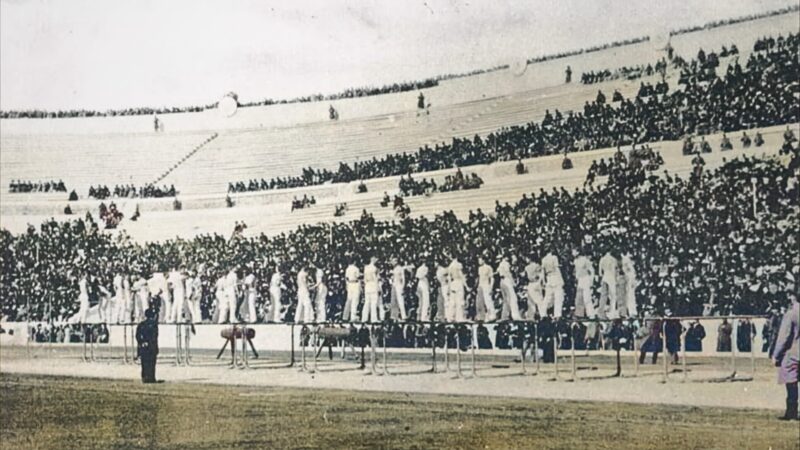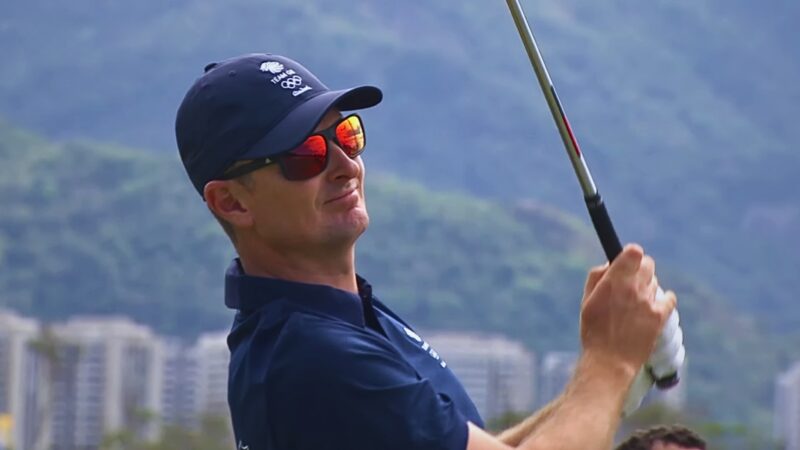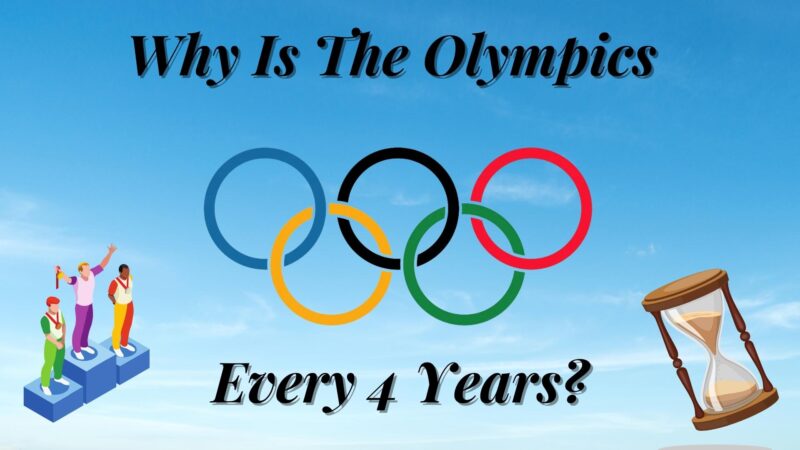The Olympic Games, the biggest athletic competition, have been held every four years for over a century, intertwining rich history and tradition with the global celebration of sport and unity. But why exactly are the Olympics spaced with such precise regularity?
The Historical Roots
The tradition of holding the Olympics every four years dates back to the ancient Olympic Games held in Olympia, Greece. The interval known as an “Olympiad” was not just a measure of time but also a means through which the Greeks structured their years.
Ancient Traditions
The ancient Olympic Games were not merely an athletic competition but a religious and cultural festival that held significant importance in Greek society.
The four-year period, referred to as an “Olympiad,” was used by historians as a unit of time to record events and date historical occurrences. The games were intertwined with religious practices, honoring Zeus, and were embedded in the societal and political fabric of the time.
The Revival of the Modern Olympics

Pierre de Coubertin, the father of the modern Olympic Games, was inspired by the ancient tradition and sought to revive it in a contemporary format. The first modern Olympics were held in 1896 in Athens, Greece, and the four-year cycle was adopted, paying homage to the ancient tradition while also providing a structured and regular interval for the games.
This interval allowed for adequate preparation time for the athletes and organizing cities, balancing logistical demands with anticipation and excitement.
Logistical and Financial Segment
Organizing the Olympic Games is a monumental task, involving intricate planning, substantial financial investments, and comprehensive logistical arrangements. The four-year cycle allows host cities and athletes ample time to prepare and ensures the sustainability of the event.
The Herculean Task of Preparation
- Infrastructure Development: Host cities often need to develop new infrastructures, such as stadiums, transportation systems, and accommodation facilities, to cater to the influx of athletes and spectators.
- Economic and Financial Planning: The financial burden and economic implications of hosting the games require meticulous planning and substantial investment from the host city and country.
- Athlete Preparation: Athletes, too, benefit from the four-year cycle, providing them with a structured timeframe to train, qualify, and peak in their performance.
Global Participation and Interest
Ensuring global participation and maintaining worldwide interest are crucial for the success and relevance of the Olympic Games. The four-year gap serves to build anticipation, allows for recovery and preparation of athletes, and ensures that the event does not lose its charm and significance.
- Building Anticipation: The interval helps in building anticipation and excitement among spectators and fans, ensuring that the event remains a rare and special occurrence.
- Global Participation: The time allows all participating nations to conduct their qualifying events, prepare their athletes, and organize their participation on the global stage.
- Maintaining Relevance: The quadrennial cycle ensures that the Olympics do not become commonplace and retains its status as a rare and prestigious event, maintaining global interest and relevance.
Cultural and Symbolic Significance
The Olympics is not merely a sporting event but a symbol of unity, peace, and global camaraderie. The four-year cycle enhances its symbolic significance and allows it to be a reflection of global developments and changes.
A Symbol of Unity and Peace
The Olympics serve as a powerful symbol of global unity and peace, providing a platform where nations come together to celebrate athletic prowess, setting aside political and cultural differences.
The event acts as a reminder of shared humanity and the potential for peaceful coexistence and cooperation among diverse nations.
A Sign of Global Developments
The four-year gap between the Olympic Games allows them to serve as a snapshot of global developments, both in the realm of sports and beyond.
Changes in global politics, advancements in athletic training, and evolution in societal norms and values are often reflected in each iteration of the games, providing a rich tapestry that documents the unfolding of global history.
The Impact on Athletes and Their Careers
The four-year cycle of the Olympic Games has a profound impact on the athletes who compete, shaping their careers, training cycles, and personal development.
This regular interval allows athletes to plan, peak, and potentially recover or retire within a structured timeframe.
Career Planning and Development

For athletes, the Olympics is often the pinnacle of their career, a stage where they can showcase their skills and hard work on a global platform. The four-year cycle allows athletes to strategically plan their training, ensuring they peak physically and mentally at the right time.
It also provides a clear timeframe for career planning, allowing athletes to align their competitive peak with the Olympic schedule, and potentially, decide when might be the right time to retire or transition to a new phase in their career.
After all, receiving an Olympic medal is bound to be one of the highest achievements in an athlete’s career.
The Mental and Physical Peak
The physical and mental preparation required to compete at the Olympic level is immense. Athletes need to ensure that they are at their physical peak during the Olympics, which involves meticulous planning and preparation.
The mental aspect, including managing pressure and expectations, is equally crucial. The four-year cycle provides a structured timeframe for athletes to build their physical capabilities and mental resilience, ensuring they are ready to perform at their best when the time comes.
The Evolution and Innovation in Sports
The Olympics serve as a catalyst for innovation and evolution in the realm of sports, from advancements in training methodologies to the introduction of new sports and disciplines.
The four-year interval allows for the development, testing, and implementation of these innovations, ensuring that each iteration of the games brings something new and exciting to the table.
Advancements in Training and Technology
The time between each Olympic Games allows for advancements in training methodologies and sports technology to be developed and implemented. Coaches and athletes can incorporate new training techniques, utilize innovative technologies, and adapt to any changes in the rules or formats of their respective sports.
This ensures that each iteration of the Olympics showcases the pinnacle of athletic performance, with athletes often breaking records and pushing the boundaries of what is physically possible.
Introduction of New Sports and Disciplines

The four-year cycle also provides a window for the introduction of new sports and disciplines to the Olympic program. This allows for the evolution of the games, ensuring they remain relevant and reflective of global trends in sports.
For instance, skateboarding and surfing were introduced in the Tokyo 2020 Olympics, reflecting their global popularity and appeal. It is common for some sports to lose or gain a status of the Olympic sport, which was the case with golf.
The interval allows for new sports to be proposed, evaluated, and integrated into the Olympic program, ensuring the games evolve and continue to captivate global audiences.
Global Impact
Beyond the realm of sports, the Olympic Games have a profound impact on global society, serving as a source of inspiration, a driver for societal change, and a platform for addressing global issues.
The four-year cycle ensures that these impacts are sustained and built upon, allowing the games to be more than just a sporting event.
Inspiring the Next Generation
The Olympics have the power to inspire, providing role models for the next generation of athletes and non-athletes alike. Stories of perseverance, triumph over adversity, and international camaraderie permeate each iteration of the games, providing a rich source of inspiration for people around the world.
The four-year wait for these stories helps to build anticipation and ensures that when they do arrive, they are all the more impactful and cherished.
Addressing Global Issues and Promoting Change
The Olympic Games also serve as a platform for addressing global issues and promoting societal change. From promoting gender equality and inclusivity to addressing political and social issues, the Olympics often serve as a catalyst for global conversations and change.
The four-year cycle allows for these conversations to be sustained and built upon, ensuring that the impact of the games extends far beyond the sporting arena.
Legacy and Impact on Host Cities
The Olympic Games leave an indelible mark on host cities, creating a legacy that can be seen in their infrastructure, economy, and global standing. The four-year cycle allows cities to adequately prepare for the games and ensures that their impact and legacy are maximized and sustained.
Infrastructure and Economy
Hosting the Olympics often necessitates significant infrastructure development, including sports venues, transportation networks, and accommodation facilities. These developments can leave a lasting legacy, potentially boosting tourism, improving local facilities, and enhancing the global standing of the host city.
However, the economic impact of hosting the games is multifaceted and can vary, with some cities benefiting from the investment, while others struggle with the costs involved.
Global Standing and Soft Power
The Olympics also impact the global standing and soft power of host cities and nations. Successfully hosting the games can enhance a nation’s reputation, showcasing its organizational capabilities, cultural richness, and hospitality on the global stage.
The well-known time schedule allows nations to strategically plan their bids to host the games, ensuring they are positioned to maximize the potential benefits and mitigate the challenges involved.
Challenges and Criticisms
While the Olympic Games are celebrated and cherished by many, they are not without their challenges and criticisms.
From concerns about the costs involved to issues related to human rights and environmental impact, the games often spark debate and discussion about their role and impact on global society.
Economic and Social Challenges
- Economic Burden: The financial burden of hosting the Olympics can be substantial, with costs often exceeding initial estimates and benefits sometimes failing to materialize.
- Displacement of Communities: Infrastructure development can lead to the displacement of local communities and has sparked concerns and protests in various host cities.
- Inequality: The distribution of the economic benefits of the games is often unequal, with concerns raised about their impact on local communities and businesses.
Ethical and Environmental Concerns

The Olympics have also faced criticisms related to ethical and environmental concerns.
Issues related to human rights, labor practices, and the environmental impact of the games have sparked debate and led to calls for reforms and changes in how the games are organized and conducted.
- Human Rights: Concerns about human rights in host nations have been a point of contention, with calls for the International Olympic Committee to consider these issues when awarding the games.
- Environmental Impact: The environmental footprint of the games, including the impact of infrastructure development and the event itself, has also been scrutinized, leading to calls for greater sustainability in how the games are conducted.
The Future of the Olympic Games
As we look to the future, the Olympic Games face new challenges and opportunities.
Adapting to a Changing World
The global pandemic has highlighted the vulnerability and challenges faced by the Olympic Games.
The postponement of the Tokyo 2020 Olympics and the adaptations required to conduct the games in the midst of a global health crisis have sparked discussions about the future format and nature of the games.
Innovation and Inclusivity
The Olympics will need to continue to evolve and innovate to remain relevant and impactful in the future.
This includes implementation of new sports and formats, ensuring the games are inclusive and representative of global society, and addressing the challenges and criticisms they face.
- New Sports and Formats: The inclusion of new sports and formats, such as esports and mixed-gender events, will be crucial in ensuring the games remain relevant and engaging for future generations.
- Inclusivity: Ensuring the games are inclusive and representative, both in terms of the athletes who compete and the sports that are included, will be crucial in ensuring they are reflective of global society and values.
FAQs
How does the International Olympic Committee (IOC) select host cities for the Olympic Games?
The selection of host cities for the Olympic Games is a meticulous process conducted by the International Olympic Committee (IOC). Cities around the world submit bids, showcasing their capabilities, plans, and visions for the games. The IOC evaluates these bids based on various criteria, including infrastructure, organizational capacity, legacy plans, and potential impact. After thorough evaluation and discussions, the IOC members vote to select the host city, typically seven years before the games are scheduled to take place.
Have there been instances where the Olympics were not held every four years?
Yes, there have been instances where the Olympic Games were not held as scheduled. The most notable examples are the cancellations of the games during the World Wars (1916, 1940, and 1944). More recently, the Tokyo 2020 Olympics were postponed to 2021 due to the global COVID-19 pandemic, marking a rare deviation from the traditional four-year cycle.
What mechanisms are in place to ensure fair play and integrity in the Olympic Games?
Ensuring fair play and integrity is paramount in the Olympic Games. The IOC and respective International Sports Federations implement strict regulations and monitoring systems to uphold these principles.
This includes stringent anti-doping measures, officiating standards, and mechanisms to address any disputes or controversies. The Court of Arbitration for Sport (CAS) also plays a crucial role in resolving legal disputes in the field of sport during the games.
How does the Olympic Games facilitate the participation of athletes from developing countries?
The IOC facilitates the participation of athletes from developing countries through various programs and initiatives. The Olympic Solidarity program, for instance, provides financial and technical assistance to National Olympic Committees (NOCs) of developing countries, ensuring that their athletes can prepare and participate in the games.
This includes support for athlete development, training of coaches, and assistance in preparing the teams for the Olympics.
How are new sports introduced into the Olympic Games, and what is the process behind it?
The introduction of new sports into the Olympic Games is governed by the IOC through a structured process. Proposals for new sports can be submitted by International Federations, NOCs, and the Organizing Committees of the Olympic Games (OCOGs).
The IOC evaluates these proposals based on various criteria, including global popularity, governance, and alignment with the Olympic values. The final decision is made by the IOC Session, where members vote on the inclusion of new sports, ensuring that the Olympic program evolves and remains relevant to global audiences.
Summary
As we look to the future, the games will need to adapt and evolve, embracing innovation and addressing the challenges they face to continue to captivate and inspire global audiences. However, chances are very low that the interval of the games will change anytime soon.
